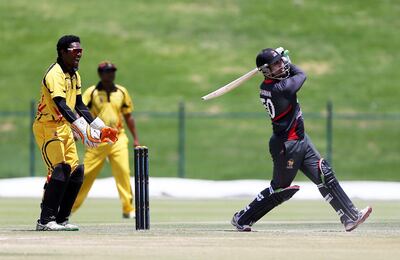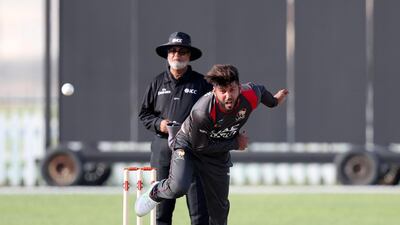Mohammed Naveed and Shaiman Anwar have been told they are paying for the “cynical betrayal of their positions, their teammates, and all supporters of UAE cricket” after they were banned from the sport for eight years.
The former UAE players were each found guilty in January of two charges of breaching cricket’s anti-corruption code.
Two months later the independent tribunal have announced their sanctions will be a period of ineligibility of eight years.
The ban is backdated to October 2019, which is when the two players were thrown out of the sport as part of a corruption investigation which rocked the sport here.
The former UAE players were found guilty of “being party to an agreement or effort to fix or contrive or otherwise influence improperly” matches at the 2019 T20 World Cup Qualifier.
The report stated they had discussed fixing aspects of matches against Oman and Ireland in that competition, in exchange for as much as Dh1 million.
The sanction fell short of the maximum for the offences for which they were found guilty, which was a life ban.
However, it almost certainly ends the career of both. They will be eligible to play again in October 2027. By that time, Shaiman will be 48, and Naveed 40.
According to Alex Marshall, the general manager of the ICC’s integrity department, the bans should serve as a warning to other players who consider taking the “wrong path”.
“Mohammad Naveed and Shaiman Anwar represented their adopted country, the UAE at the highest level in cricket,” Marshall said.
“Naveed was the captain and leading wicket-taker. Anwar was the opening bat. Both had long international careers and were well versed in the threat from match fixers.
“That they both chose to engage with this corrupt activity was a cynical betrayal of their positions, their teammates, and all supporters of UAE cricket.
“I am pleased that the independent tribunal has imposed significant bans from all forms of cricket and this should serve as a warning to any cricketer who considers taking the wrong path.”
The tribunal reached its verdict over their guilt after considering more than 400 pages of evidence from the ICC’s anti-corruption investigation, as well as a two-day hearing in November 2020.
In their 46-page report into the case, the tribunal stated that the duo’s “behaviour was wholly inconsistent with that of persons repelled by a corrupt approach”. Instead, they felt it to be “wholly consistent with that of persons who either instigated such an approach or were willing recipients of one.”
In their report reasoning out the length of the bans, the tribunal stated it “accepts that in appropriate cases the period could mean a lifetime ban from the sport - such cases including where a respondent has sought to corrupt others”.
“Mr Anwar and Mr Naveed’s offences did not amount to actual fixing," the report said
"Nor, in the tribunal’s view could their conduct be equated qualitatively to that which on a single occasion has attracted a lifetime ban.
“That said the tribunal considers that the imperatives referred to require in the present climate where corruption in cricket persists and meaningful deterrence is demanded, that sanctions substantially above the minimum are the appropriate starting point.”
Naveed is understood to be consider appealing his case at the Court of Arbitration for Sport, and claims there “is not any proof against me”.

“As I served UAE cricket from tape ball to international [I] can't imagine just one mistake which I accepted [for not informing ICC’s anti-corruption unit of a corrupt approach] they will ban me for eight years,” Naveed wrote.
In his role as a fast bowler, Naveed reached the highest ranking in the ICC’s ratings of any UAE player in history, and he says he does not want to leave the sport in such circumstances.
“If they have proof just show on media openly,” Naveed wrote. “I am a fighter as I always bowl in pressure, and will face everything.
“[I] don't want to leave my cricket with bad and dirty way. All other players in the world are getting two year [or] three year ban after accepting everything. Even I haven’t done bad.”
Three other UAE players also remain banned by the ICC, pending an anti-corruption investigation into the sport in the Emirates.
Qadeer Ahmed, a seam bowler, was also suspended at the same time as Naveed and Shaiman, on a variety of charges of breaching cricket’s anti-corruption code.
In September 2020, opening batsman Ashfaq Ahmed and fast bowler Amir Hayat were formally charged with five counts of breaching the code.
“Emirates Cricket Board acknowledge the efforts of the independent tribunal and ICC Anti-Corruption Unit investigation, findings and sanctioning involving two of its suspended players; Mohammad Naveed and Shaiman Anwar Butt,” the ECB wrote in a statement.
“Emirates Cricket remains firm in its stance denouncing any activities of corruption and those undertaken by the players in this anti-corruption case.”


